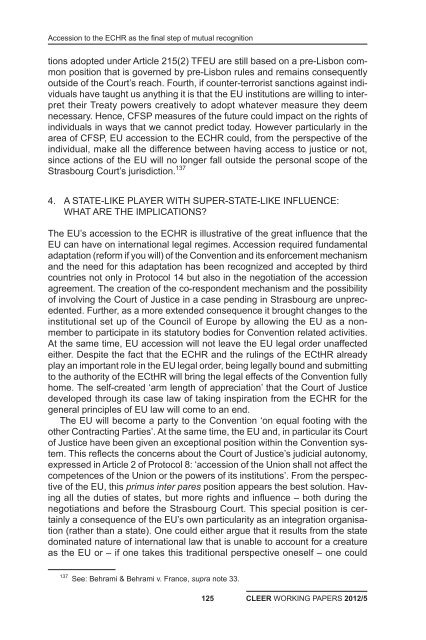Principles and practices of EU external representation - TMC Asser ...
Principles and practices of EU external representation - TMC Asser ...
Principles and practices of EU external representation - TMC Asser ...
You also want an ePaper? Increase the reach of your titles
YUMPU automatically turns print PDFs into web optimized ePapers that Google loves.
Accession to the ECHR as the final step <strong>of</strong> mutual recognition<br />
tions adopted under Article 215(2) TF<strong>EU</strong> are still based on a pre-Lisbon common<br />
position that is governed by pre-Lisbon rules <strong>and</strong> remains consequently<br />
outside <strong>of</strong> the Court’s reach. Fourth, if counter-terrorist sanctions against individuals<br />
have taught us anything it is that the <strong>EU</strong> institutions are willing to interpret<br />
their Treaty powers creatively to adopt whatever measure they deem<br />
necessary. Hence, CFSP measures <strong>of</strong> the future could impact on the rights <strong>of</strong><br />
individuals in ways that we cannot predict today. However particularly in the<br />
area <strong>of</strong> CFSP, <strong>EU</strong> accession to the ECHR could, from the perspective <strong>of</strong> the<br />
individual, make all the difference between having access to justice or not,<br />
since actions <strong>of</strong> the <strong>EU</strong> will no longer fall outside the personal scope <strong>of</strong> the<br />
Strasbourg Court’s jurisdiction. 137<br />
4. A State-Like Player with Super-State-Like Influence:<br />
What are the Implications?<br />
The <strong>EU</strong>’s accession to the ECHR is illustrative <strong>of</strong> the great influence that the<br />
<strong>EU</strong> can have on international legal regimes. Accession required fundamental<br />
adaptation (reform if you will) <strong>of</strong> the Convention <strong>and</strong> its enforcement mechanism<br />
<strong>and</strong> the need for this adaptation has been recognized <strong>and</strong> accepted by third<br />
countries not only in Protocol 14 but also in the negotiation <strong>of</strong> the accession<br />
agreement. The creation <strong>of</strong> the co-respondent mechanism <strong>and</strong> the possibility<br />
<strong>of</strong> involving the Court <strong>of</strong> Justice in a case pending in Strasbourg are unprecedented.<br />
Further, as a more extended consequence it brought changes to the<br />
institutional set up <strong>of</strong> the Council <strong>of</strong> Europe by allowing the <strong>EU</strong> as a nonmember<br />
to participate in its statutory bodies for Convention related activities.<br />
At the same time, <strong>EU</strong> accession will not leave the <strong>EU</strong> legal order unaffected<br />
either. Despite the fact that the ECHR <strong>and</strong> the rulings <strong>of</strong> the ECtHR already<br />
play an important role in the <strong>EU</strong> legal order, being legally bound <strong>and</strong> submitting<br />
to the authority <strong>of</strong> the ECtHR will bring the legal effects <strong>of</strong> the Convention fully<br />
home. The self-created ‘arm length <strong>of</strong> appreciation’ that the Court <strong>of</strong> Justice<br />
developed through its case law <strong>of</strong> taking inspiration from the ECHR for the<br />
general principles <strong>of</strong> <strong>EU</strong> law will come to an end.<br />
The <strong>EU</strong> will become a party to the Convention ‘on equal footing with the<br />
other Contracting Parties’. At the same time, the <strong>EU</strong> <strong>and</strong>, in particular its Court<br />
<strong>of</strong> Justice have been given an exceptional position within the Convention system.<br />
This reflects the concerns about the Court <strong>of</strong> Justice’s judicial autonomy,<br />
expressed in Article 2 <strong>of</strong> Protocol 8: ‘accession <strong>of</strong> the Union shall not affect the<br />
competences <strong>of</strong> the Union or the powers <strong>of</strong> its institutions’. From the perspective<br />
<strong>of</strong> the <strong>EU</strong>, this primus inter pares position appears the best solution. Having<br />
all the duties <strong>of</strong> states, but more rights <strong>and</strong> influence – both during the<br />
negotiations <strong>and</strong> before the Strasbourg Court. This special position is certainly<br />
a consequence <strong>of</strong> the <strong>EU</strong>’s own particularity as an integration organisation<br />
(rather than a state). One could either argue that it results from the state<br />
dominated nature <strong>of</strong> international law that is unable to account for a creature<br />
as the <strong>EU</strong> or – if one takes this traditional perspective oneself – one could<br />
137 See: Behrami & Behrami v. France, supra note 33.<br />
125<br />
CLEER WORKING PAPERS 2012/5

















